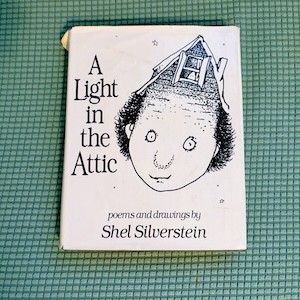Shel Silverstein's Timeless Influence
The Enduring Magic of Poetry and Music

May 31, 2025
One of the reasons I read fiction is to expand my perspective and see the world from a different vantage point. A great novel might do this once or twice; a poem can permanently shift your worldview with just a few lines.
Somewhere around ten years ago, I went home to visit my parents in Michigan. I opened the closet in my bedroom and looked over the contents: childhood sports trophies, baseball cards, high school varsity jacket, Marine Corps uniforms, and a seabag filled with rock climbing gear lying on the floor. Two hardcover books on the shelf grabbed my attention—Where the Sidewalk Ends and A Light in the Attic by Shel Silverstein.
I can’t say for sure why the stark white covers with bold black text stood out from all the other faded childhood memories, but I had a strong sense that they were important. So I put them in my bag and took them with me back to San Diego where they found a spot on the bookshelf.
At my house in San Diego, the bookshelf was situated so I’d walk by it every time I came through the front door. Eventually, curiosity got the better of me. I opened A Light in the Attic, not sure what to expect. What I uncovered was a treasure—poems clearly meant for more than just entertaining children. I was hooked.
The first two poems from A Light in the Attic are short and powerful.
A LIGHT IN THE ATTIC
There’s a light on in the attic.
Though the house is dark and shuttered,
I can see a flickerin’ flutter,
And I know what it’s about.
There’s a light on in the attic.
I can see it from the outside,
And I know you’re on the inside . . . lookin’ out.
HOW MANY, HOW MUCH
How many slams in an old screen door?
Depends on how loud you shut it.
How many slices in a bread?
Depends on how thin you cut it.
How much good inside a day?
Depends on how good you live ‘em.
How much love inside a friend?
Depends on how much you give ‘em.
Those two poems give a compelling preview of what is to come—and they only get better.
As I worked my way through the book, every poem made me stop and think about a person I know, a decision I made, or an opinion that I have. The thoughts and memories stirred up by these poems are different for every one of us who reads them. And that, in my opinion, is what makes Shel Silverstein poems so magical.
Shel Silverstein’s poems add levity to the seriousness lurking below the surface. First off, they’re clever. Each poem has its own way of keenly tilting the perspective and encouraging you to reevaluate your position. Secondly, mixed in with the cleverness is a sizable dose of humor. If you read a few of these poems and don’t smile, I have some questions for you. Lastly, the illustrations pull it all together and give the poems another dimension.
When I like something—a book, a poem, a band, a painting—I want to know more about the person who created it. In many cases there isn’t a wealth of information available; this was especially true before the internet became ubiquitous. If I had to, I would probably trace my curiosity back to the late 1990s when VH1 came out with their Behind the Music series. In recent years, podcasts have given more access to artists and their sources for inspiration than I ever imagined possible. For some artists, maybe those details are better left unknown, but I still want to know.
So who is the creative genius responsible for creating these wonderful poems? I only made my way through a few pages of A Light in the Attic before I picked up my laptop to find out the answer. Shel Silverstein was an Army veteran and cartoonist for Stars & Stripes magazine from 1953 to 1955. After leaving the Army, he wrote and drew illustrations for Playboy magazine during the late 1950s and 1960s. Certainly not what I expected, but nothing beyond comprehension. But it shook me, in a good way, when I read that Shel Silverstein wrote several hit songs for country artists.
When I first read on Wikipedia that Shel Silverstein wrote "A Boy Named Sue" and "25 Minutes To Go," I didn’t believe it. I had to stop and think for a moment before it fell into place. Clever lyrics with a sense of seriousness lurking beneath the surface—that’s not how I would typically describe Johnny Cash songs; these characteristics felt distinctly Shel Silverstein. His musical career also included his own folk albums and writing lyrics behind hit songs recorded by Loretta Lynn, Waylon Jennings, and Dr. Hook.
Shel Silverstein seamlessly wove together humor, wit, and a lifetime of experience into poetry that continues to influence readers long after the pages have been turned. His poems put a lighthearted smile on our faces while subtly shifting our perspectives, challenging us to view ourselves and the world differently. Shel Silverstein’s creative talents influenced an eclectic range of music, poetry, literature, theater, and film—he was a true renaissance man.
P.S.